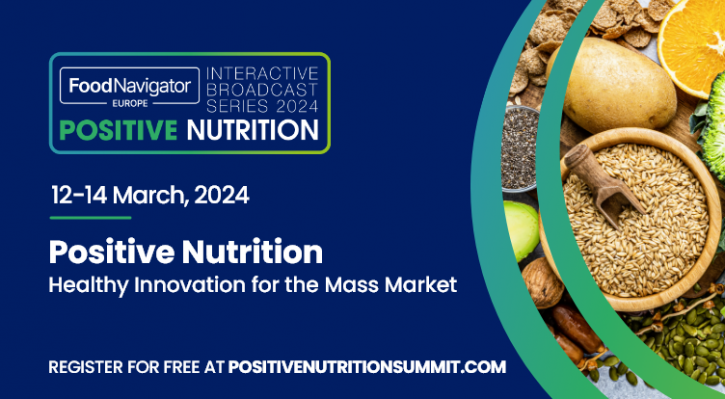Sweetener ‘controversy’ fuels consumer confusion: How should industry respond?

Sugar reduction remains a major trend in the food industry as food-related illness works its way up the health agenda. Excessive sugar consumption is known to increase the risk of developing obesity and non-communicable diseases such as dental disease.
The trend is not led by manufacturers or policymakers alone (although sugar taxes and junk food regulations have ignited reformulation efforts). Shoppers, too, are actively working to reduce their sugar intake.
According to research conducted by food processing and packaging supplier Tetra Pak, 40% of consumers say they are cutting back on sugar and more than half say excess sugar consumption is their number one concern when shopping for food and drink – more so than concerns around fat and cholesterol.
When manufacturers respond to consumer demand for reduced or zero sugar products, they often turn to alternative sweeteners. Common examples include aspartame, saccharin, sucralose and stevia.
But this ingredients category has recently found itself under a cloud of late, leaving consumers confused. With reformulation strategies now even more spotlight, how should industry respond?
What’s controversial about alternative sweeteners?
In recent years, industry has seen a sharp spike in the introduction of sugar alternatives fuelled by voluntary reformulation efforts and regulations. Examples in the UK include the Soft Drinks Industry Levy and HFSS (high fat, sugar and salt) laws.
As a result, consumers are starting to spot a greater variety of low or no sugar options hitting the shelves, explained Brigid McKevith, head of regulatory at UK consultancy Ashbury. “Yet there’s growing controversy and confusion about the alternative sweeteners that are often being swapped in.”
High-profile examples include the World Health Organization’s (WHO) recent recommendation on the use of non-sugar sweeteners. The proposed guidance suggests sweeteners should not be used to control body weight, and that potential undesirable effects may be associated with long-term use, such as an increased risk of type 2 diabetes, cardiovascular diseases, and mortality in adults.
Do sweeteners negatively impact heart health?
The World Health Organization’s recommendation on the use of non-sugar sweeteners came after a systemic review of available evidence suggested a potential risk of cardiovascular disease could be associated with their consumption.
More recently, new research published in Circulation: Arrhythmia and Electrophysiology, found that drinking two litres or more of either sugar sweetened or artificially sweetened drinks in a week is associated with risk of atrial fibrillation (a type of irregular heart rhythm). The link was found to be stronger for artificially sweetened drinks than sugar sweetened drinks.
Since the study was observational in nature, it shows associations and not causation. According to the International Sweeteners Association, which represents suppliers and users of low/no calorie sweeteners, for this reason the study may risk confusing consumers ‘given observational research cannot establish a cause-and-effect relationship’.
Not long after, popular sweetener aspartame was classified ‘possibly carcinogenic’ by the International Agency for Research on Cancer (IARC), based on limited evidence for cancer in humans – specifically for hepatocellular carcinoma, a type of liver cancer. At the same time, the Joint Expert Committee on Food Additives (JECFA) announced it found no convincing evidence that aspartame causes harm when consumed within daily intake guidelines.
It is perhaps unsurprising then that a ‘lack of universal understanding and trust’ in sweeteners exist amongst consumers. Some consumers have admitted to not realising how tightly regulated sweeteners are, said Ashbury’s McKevith.
“This was potentially heightened by the aspartame ‘scare’ last year – despite 90 global food safety agencies confirming that aspartame is safe to consume at current permitted use levels.”
Confusion around sweeteners persist, how should industry respond?
According to research by ingredients supplier Kerry, not everyone has the same beliefs or understandings of sugar and sweeteners: some consumers prefer sugar, while others prefer sweeteners.
If a consensus has not been achieved, that’s completely understandable, suggested another ingredients supplier earlier this year. “NGOs and various studies on what to eat and not to eat have left consumes with more questions than answers,” said Kristen Germana, global strategic director, sugar reduction, Ingredion.
But whether consumers are aware or not, most are already consuming products that contain a mix of sugar and sweeteners. The challenge for industry, therefore, is not necessarily how to reformulate sweet products with sugar substitutes, but how to dispel consumer confusion around this ingredients category, suggests Ashbury.
“It’s important for those within the industry to collaborate to enhance understanding of sugar, its effects and its alternatives, bringing an end to any misconceptions,” advised regulatory lead McKevith.
“Long-term, these actions should ensure that the perceptions of both sugar and sugar reduction are entirely understood, allowing consumers to make fully informed decisions about food that is safe and wholesome, and that aligns with their diet, lifestyle, and nutritional goals.”
It’s an ‘exciting time’ for food manufacturers, McKevith continued. “But it’s vital to stay ahead of the game to ensure consumers have products they want, products they understand, and products that comply with legislation.”
Sugar reduction is here to stay: what other strategies are available?
Ashbury is convinced the sugar reduction trend will live on. “With more consumers taking a proactive approach in respect to their health and wellbeing, sustainability and ethics, the sugar reduction (and alternatives) market is undoubtedly here to stay,” said the regulatory lead.
But swapping out sugar for sweetener alternatives is not the only solution on the table.
Tetra Pak, which judged low-sugar beverage alternatives to be one of the ‘standout trends’ of 2023, notes that some manufacturers are moving away from sweetener alternatives and instead investing in new sugar substitutes that don’t change the product profile.
One approach co-developed by the processing and packaging major can be used to de-sugar juices. The technology uses fermentation to convert the sugars in juice to alcohol – much as in wine making.
“The new technology can reduce sugar levels down to zero while maintaining the nutritional value of the juice, along with its pulp, aroma concentration and acidity,” Anna Larsson, business insights leader at Tetra Pak told FoodNavigator.
According to Tetra Pak research, close to a third of consumers said they would be willing to may more for de-sugared juice. “As such, we predict that de-sugared juices are going to be a growing trend in 2024, as manufacturers respond to consumer preferences and health choices.”
Other companies involved in ‘de-sugaring’ beverages include FMCG major Nestlé, which is using an enzymatic process to reduce sugar without needing to add sweeteners or building agents to replace its volume. The technology can reduce lactose in milk, maltose in malt beverages, and sucrose in fruit juice.
BlueTree Technologies is another removing sugar from beverages without adding a substitute. Instead, the Israeli start-up is using filtration and adsorption techniques to cut disaccharides from milk and juice.
Keen to learn more about sugar reduction strategies? Tune into our upcoming Positive Nutrition event 12-14 March 2024.

















